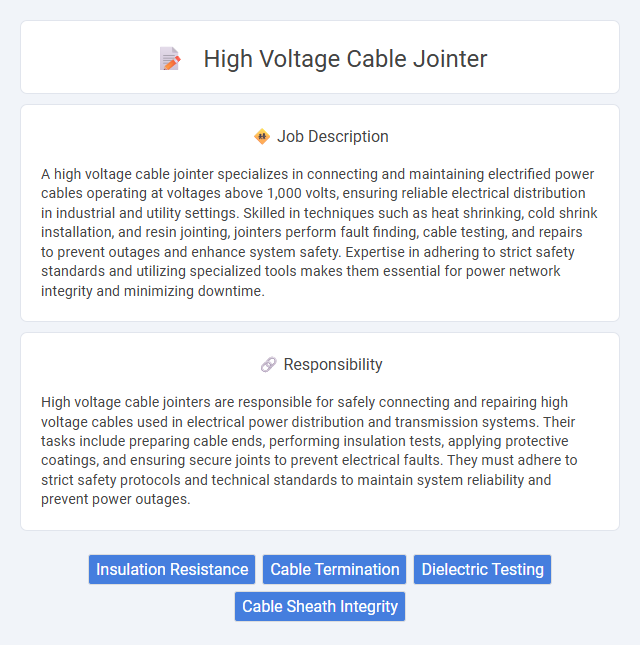
A high voltage cable jointer specializes in connecting and maintaining electrified power cables operating at voltages above 1,000 volts, ensuring reliable electrical distribution in industrial and utility settings. Skilled in techniques such as heat shrinking, cold shrink installation, and resin jointing, jointers perform fault finding, cable testing, and repairs to prevent outages and enhance system safety. Expertise in adhering to strict safety standards and utilizing specialized tools makes them essential for power network integrity and minimizing downtime.
Individuals with strong problem-solving skills and good manual dexterity are likely suitable for high voltage cable jointer roles, as the job demands precision and technical expertise. Those who are comfortable working in potentially hazardous conditions and can maintain focus under pressure may have a higher probability of success in this profession. Physical fitness and the ability to handle stressful environments could also influence suitability for this high-risk electrical work.
Qualification
A high voltage cable jointer must possess specialized technical qualifications including completion of an electrical apprenticeship and certification in high voltage cable jointing. Proficiency in interpreting electrical schematics, knowledge of safety standards, and experience with insulated cables rated typically from 11kV to 33kV are essential. Advanced training in fault detection, cable testing, and adherence to national electrical codes ensures competence and job safety.
Responsibility
High voltage cable jointers are responsible for safely connecting and repairing high voltage cables used in electrical power distribution and transmission systems. Their tasks include preparing cable ends, performing insulation tests, applying protective coatings, and ensuring secure joints to prevent electrical faults. They must adhere to strict safety protocols and technical standards to maintain system reliability and prevent power outages.
Benefit
A high voltage cable jointer job likely offers significant financial benefits due to the specialized skills required and the critical nature of the work. There is probable job stability given the ongoing need for maintenance and repair of electrical infrastructure. The role may also provide opportunities for career advancement and skill development in the electrical and utility sectors.
Challenge
High voltage cable jointer jobs likely involve complex challenges due to the need for precision in connecting live electrical cables safely, often under harsh environmental conditions. The role probably demands strong technical skills and risk management abilities to prevent electrical hazards and ensure system reliability. Candidates might frequently face pressure to troubleshoot unexpected faults and maintain strict compliance with safety standards.
Career Advancement
High voltage cable jointers specialize in splicing and maintaining electrical cables essential for power distribution and industrial applications. Career advancement opportunities include progressing to supervisory roles, project management, or technical training positions within utility companies and construction firms. Gaining certifications in advanced cable technologies and safety standards significantly enhances prospects for higher salaries and leadership responsibilities.
Key Terms
Insulation Resistance
High voltage cable jointers specialize in connecting and repairing power cables while ensuring optimal insulation resistance is maintained to prevent electrical faults and enhance system reliability. They use specialized insulation testers to measure resistance values, ensuring the cable joints meet strict safety standards and minimize leakage currents. Proper insulation resistance testing is critical to detect deterioration, moisture ingress, or contamination in high voltage cable joints, thereby extending the lifespan of electrical infrastructure.
Cable Termination
High voltage cable jointers specialize in cable termination, ensuring secure and reliable connections in power distribution networks. They expertly strip, prepare, and fit cable ends with appropriate connectors and insulating materials to maintain electrical integrity and prevent faults. Precision in cable termination minimizes energy loss and enhances system safety in high voltage installations.
Dielectric Testing
High voltage cable jointers perform crucial dielectric testing to ensure the integrity and insulation strength of cable joints, preventing electrical failures and maintaining system reliability. They utilize specialized equipment like high-voltage testers and megaohmmeters to measure insulation resistance and detect potential defects or weak points within the joint. Accurate dielectric testing safeguards against power outages and enhances the safety of high voltage electrical networks.
Cable Sheath Integrity
Ensuring cable sheath integrity is critical in a high voltage cable jointer's role to prevent moisture ingress and electrical faults. Skilled jointers utilize advanced testing equipment to detect sheath damage and apply robust sealing techniques to maintain long-term insulation performance. Proper sheath restoration significantly extends cable lifespan and enhances system reliability in high voltage networks.
 kuljobs.com
kuljobs.com